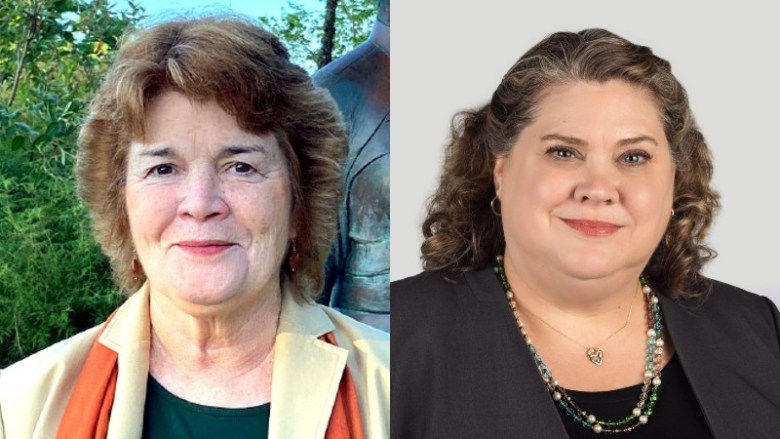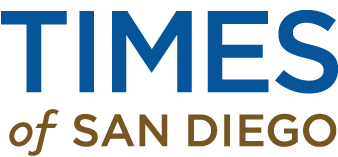
Politics and journalism have always had a symbiotic relationship. Whether that’s good or bad depends on who you are talking to. As we approach the March primary, that intersection of reporting and campaigning is coming into full focus with two San Diego races where former journalists are seeking public office.
Kate Callen, a former United Press International bureau chief, is a candidate for the District 3 seat on the San Diego City Council, facing incumbent Stephen Whitburn, who is endorsed by the Democratic Party, and two other challengers.
Jodi Cleesattle, a senior assistant attorney general who early in her career held positions as a newspaper reporter and magazine editor, is facing off against a Republican party challenger in her effort to become a Superior Court judge.
Both believe their time as professional journalists provided them experiences that will help in their efforts to win the public’s support and trust.
“Journalism is such a good training ground for politics and the law,” said Cleesattle. “You’re researching, you’re studying, you’re trying to get all the facts, learn everything you can, and then break it down and tell the story in a way that people can understand.”
She’s a communications graduate of American University in Washington, D.C., who focused on print journalism
Her professional career began at the Lancaster Eagle Gazette in Ohio covering politics and legal affairs.
“I went to law school with no intention of becoming a lawyer; I was planning to go back into journalism,” Cleesattle said.
While pursuing a law degree she would be the co-founder and executive editor of the National Jurist Magazine, which still publishes and has circulation about 100,000.
“After clerking I applied to journalism jobs and law firms that had a media law practice and ended up getting an offer at a media law firm,” she said.
For the past 17 years she’s been with the California Department of Justice and currently is the senior assistant attorney general for the tort & condemnation section.
Callen describes herself as a second-generation activist and finds her passion driven, in part, by her life as a journalist.
“Journalism is about bringing the sunlight into the darkness,” she said. “That’s what we’re doing. You’re an advocate for the facts, and you’re an advocate for the public’s interest. You will be surprised at the number of people who are on the campaign trail who have said to me, ‘I liked that you were a journalist, I think that’s what we need in City Hall.'”
While both journalism and the courts have taken hits in recent years, Cleesattle believes that “in San Diego, we have a pretty good bench, it’s pretty solid.” Criticisms aside, she believes that both the media and the judiciary play an important role in preserving democracy in our community.
Callen’s path to activism is rooted in journalism, and she uses that background to write news commentaries about the challenges District 3 faces. With a masters degree from Columbia University in writing, she initially covered public health, focusing on scientific research. While living In Washington, D.C. she moved over to United Press International, eventually moving to San Diego to be the bureau chief here.
She would ultimately move into public relations at the University of San Diego, during which time she became a board member of the San Diego Society of Professional Journalists as well as a member of the SDX Foundation, which provides support for the journalism in the community.
“As a journalist, you develop the radar for knowing when you’re being played, or when you’re being diverted or distracted,” said Callen. “As a journalist, you have an assignment and you must be laser-focused on that assignment. And there will be people who come in and say, ‘You need to say this, or you need to say that’ or they try to intimidate you. So you have to have a very thick skin. And just keep yourself steady.”
The same applies for her candidacy, said Cleesattle.
“Judges are at the disadvantage where, if they get reamed, like in the newspaper, people are quoted saying all kinds of nasty things about them, but they can’t really respond. So you just have to have a thick skin,” she said.
Callen said the money angle of running for office is tricky business
“People have approached me to talk about endorsements, any large organization, whatever,” she said. “And it’s all quid pro quo. I mean, I had one conversation with a lobbyist. And I appreciated his candor. And I said to him, ‘You know, I don’t think I want to get your endorsement.’ But he said, ‘Look, it’s all about what we give to get, we will support the people who will give us what we need.'”
Cleesattle said she’s had a different experience. “I haven’t experienced that sort of quid pro quo. Some other candidates have asked me if I might endorse, but judicial candidates are not allowed to endorse others. We can endorse judges but not other political candidates.”
Both women face fundraising hurdles but don’t seem overly concerned that it will hurt their chances for a victory.
“My opponent has raised at least four times as much money as I have,” Cleesattle said. “In my case, though, I have the numbers, you know. He might have the money, but I will have the numbers.”
Callen shares that same optimism.
“Between Jan. 16 And Feb. 17, I outraised the other candidates,” she said. “I brought in three times more contributions than they did and this is pretty shocking because I’m running against an extremely well-financed incumbent.”
Callen and Cleesattle both believe if the public was better educated on the roles of judges and journalists, the community would be a better place for it.
Said Cleesattle “As in the legal work, the general public often doesn’t understand what journalists do. They don’t understand what lawyers do. They don’t understand what judges do. And I think it’s important for us to let people know, to shine the light, and let them know how each of these positions functions and how important they are to our community and to society.”
